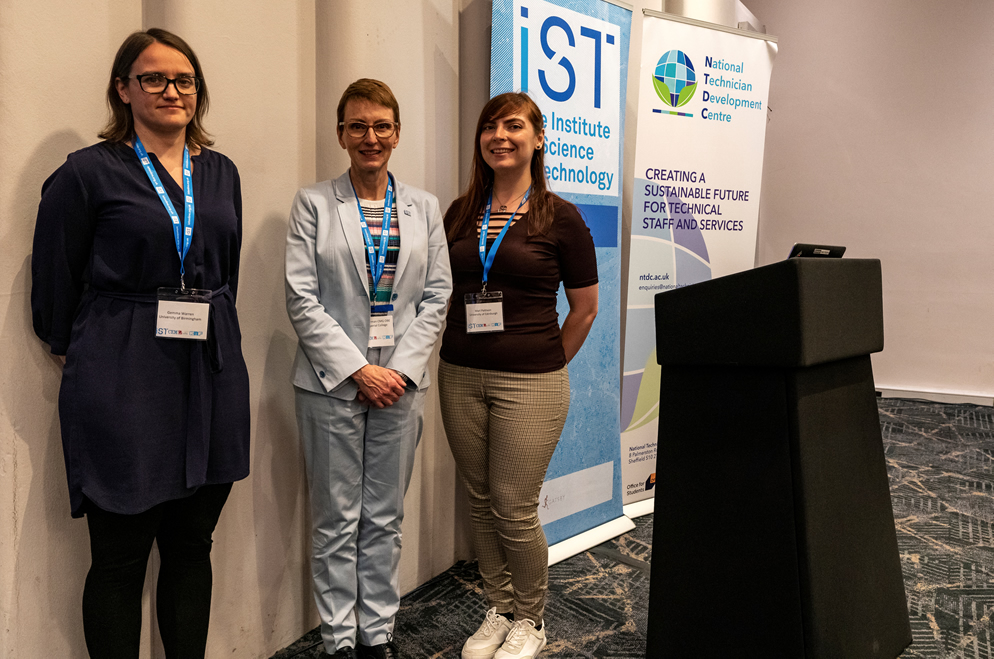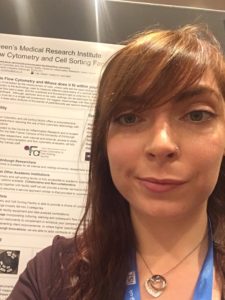Summary of IST Conference 2019 – Dr. Mari Pattison
On September 18th the annual Institute of Science and Technology (IST) Technical Conference was held in Birmingham and I was one of a small number of attendees from the University of Edinburgh. The IST is an independent body which is firmly committed to the enhancement of professional development and recognition for technical and specialist staff at all levels.
The conference boasted two Keynote presentations; Professor Alberto Vecchio opened the conference with a dazzling explanation of how to detect black holes with an incredibly accurate ruler, and Dr Helen Sharman started the afternoon session by walking us through her exciting career path all the way to the space station. While both the Keynote presentations had aspects set in space, Professor Vecchio and Dr Sharman both seemed very grounded and emphasised the importance of the teams of technicians and specialists with which they found themselves surrounded.

Mari (right), Helen Sharman (centre) and another conference attendee (left). Photo Credit Keith Barber CPAGD, FIScT, LRPS
While the range of workshop topics included photography, mobile eye-tracking, pH measurement, risk assessments and hydrogen-fuelled trains, a majority of workshops were dedicated to improvements to the technical profession. These include Newcastle University’s journey to ensure technician recognition, a summary from the Science Council of the Technician’s Commitment impact and progress, and advice on leading technical teams which was aptly titled “Herding Cats”; I attended these latter workshops.
Mel Leitch and Calum Kirk led the workshop detailing how Newcastle University has worked toward ensuring recognition for their technical staff and I left feeling optimistic from seeing another university having achieved what University of Edinburgh is striving towards. Jane Banks from the Science Council led the second workshop I attended, and she gave a thorough run through of what the Science Council has achieved across the country, including secondment placements for technicians within a university and an ongoing pilot restructuring of the university technician profession to include Grade 10. We were then given the opportunity to split into groups and have a chat with those sitting nearby and feedback to Jane and the rest of the workshop anything we felt was relevant. The final workshop, ran by Kate Dixon of Manchester Metropolitan University, was useful even though I am not a manager to technicians, having only began working as a technician three years ago. It was insightful to hear some of Kate’s anecdotes from negative experiences earlier in her career, e.g. infantilising annual reviews in a motorway McDonalds, and how that gave her the drive and determination to be a better manager. She also mentioned “Lunch & Learn” sessions and “Technical Trails’ as a way to share knowledge among technical staff – I hope that some similar sessions can be organised within the University of Edinburgh in the near future.
I presented a poster which described the instruments and services available from the QMRI Flow Cytometry and Cell Sorting Facility and was pleasantly surprised to have numerous attendees approach with queries – some people wanted an explanation of what flow cytometry even is, others were interested in possibly using our facility in the near future. I was even more surprised to be given a named commendation at the end of the conference, just missing out on one of the poster prizes – but at least it gave me the opportunity to have my picture taken with Dr Helen Sharman!

Mari and her commendation winning poster
I found the IST 2019 conference to be well worth the trip down to Birmingham and rather encouraging to see technicians from across the country networking, to hear of the continued support for movements like the Technician’s Commitment and increased recognition for technicians in general. And to top it all off, I also got to meet a technician-turned-astronaut!
Hope to see some more University of Edinburgh attendees in York for the IST 2020 conference!
Dr Mari Pattison is a Flow Cytometry Research Assistant based in the QMRI’s Flow Cytometry and Cell Sorting Facility. She enjoys cooking, powerlifting and reading, and can be found on twitter @MariPants7




Recent comments